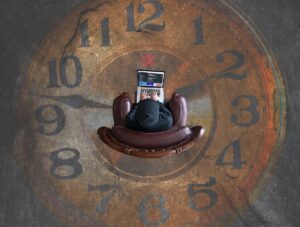We live in a time of intense change, where artificial intelligence and technological advancements are transforming the world overnight. This new reality is referred to as a BANI world, characterized as: Brittle Anxious Nonlinear Incomprehensible The BANI world...
BLOG
The Value of Our Limited Time

Ida Protuger
RELATED
Emotions and Leadership: Don’t suppress – learn how to express
Leaders are often burdened with negative emotions and unmet needs, just like everyone else. By mastering EI, particularly emotional regulation, leaders can promote a thriving, results-driven corporate culture.
Fear to Freedom: Managers Feel Fear too, don’t they?
Liberation from fear often won’t happen when the sources of fear disappear. One source of fear could be replaced by another. The fundamental reason many people feel trapped or unfree is that they believe their behavior must meet the expectations and demands of others. When the locus of control is external rather than internal.
I’m reading Oliver Burkeman’s book Four Thousand Weeks and came across a quote that made me laugh: “Productivity is a trap. Becoming more efficient just makes you more rushed, and trying to clear the decks simply makes them fill up again faster.”
I laughed because I have an ongoing debate at home, almost a criticism – about my perpetually cluttered desk, which is always filled with notebooks and papers. On my computer, I even have two “temporary” folders where I put things to sort out later. I want to change this habit and become more organized. My memory serves me well for now, and I know where every paper is and what’s on it. But in the long run, better organization would definitely make life easier.
Time as a resource
However, the essence of the book is valuable and I recommend it because it raises awareness about time as a resource and how we use it. It offers an important perspective on the pressures of modern life, where society values efficiency and productivity. Yet, as soon as one task is done, another appears, leaving us in an endless race against time.

The author suggests that instead of running this race, we should accept that not everything will get done. By seeing time as a limited resource, we can prioritize and use it for what is meaningful to us, rather than devoting time to meaningful things only when we finish our tasks.
My work as a life coach has a similar goal in terms of self-awareness around enjoyment. We often postpone enjoyment, leaving it for “when there’s time” after finishing tasks and obligations, instead of intentionally creating time for it. I share the same fact with them as the book’s title: if we live 80 years, we have about four thousand weeks. It’s up to us to decide how we’ll use our time.
Four Thousand Weeks
Do we use them for living or surviving?
I’m the type of person who, in January and February, goes into “hibernation mode.” I try to survive the time until spring as quickly as possible. I feel cold, I don’t want to go out, I dislike the gray skies, I don’t want to meet new people, and I have less desire to socialize. I’m simply waiting for warmer weather and life to return with it.
From the perspective of this book, it seems that I want to survive and not enjoy, about 300 weeks of the rest of my life, assuming I live around 80 years. So this year, I decided to live those weeks, not just survive them, but with a different rhythm than in warmer months.
I’ve started focusing less on what I don’t have like warm weather, sunshine, and blue sky, and more on small things that bring me joy, even if they’re simple, like a hot shower after being out in the cold. Since there’s less socializing, I’ve decided to enjoy the relationship I have with myself and the time I spend in self-reflection. Of course, I also cherish interactions with the people I’m close to and whose company I truly value. I am simply more aware of “what makes me feel good.”
One important aspect of spending time in self-reflection is our relationship with ourselves.
Are we focused on what we don’t have or can’t do, or on what we do have and can do? Do we criticize ourselves, or do we nurture a positive relationship with ourselves?

Relationship with oneself
Being kind to yourself doesn’t mean avoiding responsibility for tasks and obligations. When we realize we have the freedom to make decisions that shape our lives, including how we manage our time, it becomes easier to accept responsibility for our choices, rather than feeling burdened by them.
Much like nurturing a relationship with ourselves, positive relationships with people who support our growth also play a significant role in prioritizing our time.
This brings us closer to truly living our lives, rather than just surviving.
Early in my life coaching training, one of my most important reflections was realizing how many decisions I’ve made in life purely to survive, not to live. I had a traumatic childhood that taught me to make survival-driven choices when I felt powerless to change anything. But as an adult, I have the power of choice and the right to decide.
The sooner we recognize these powers, the more every second of our finite lives takes on a new kind of value.
